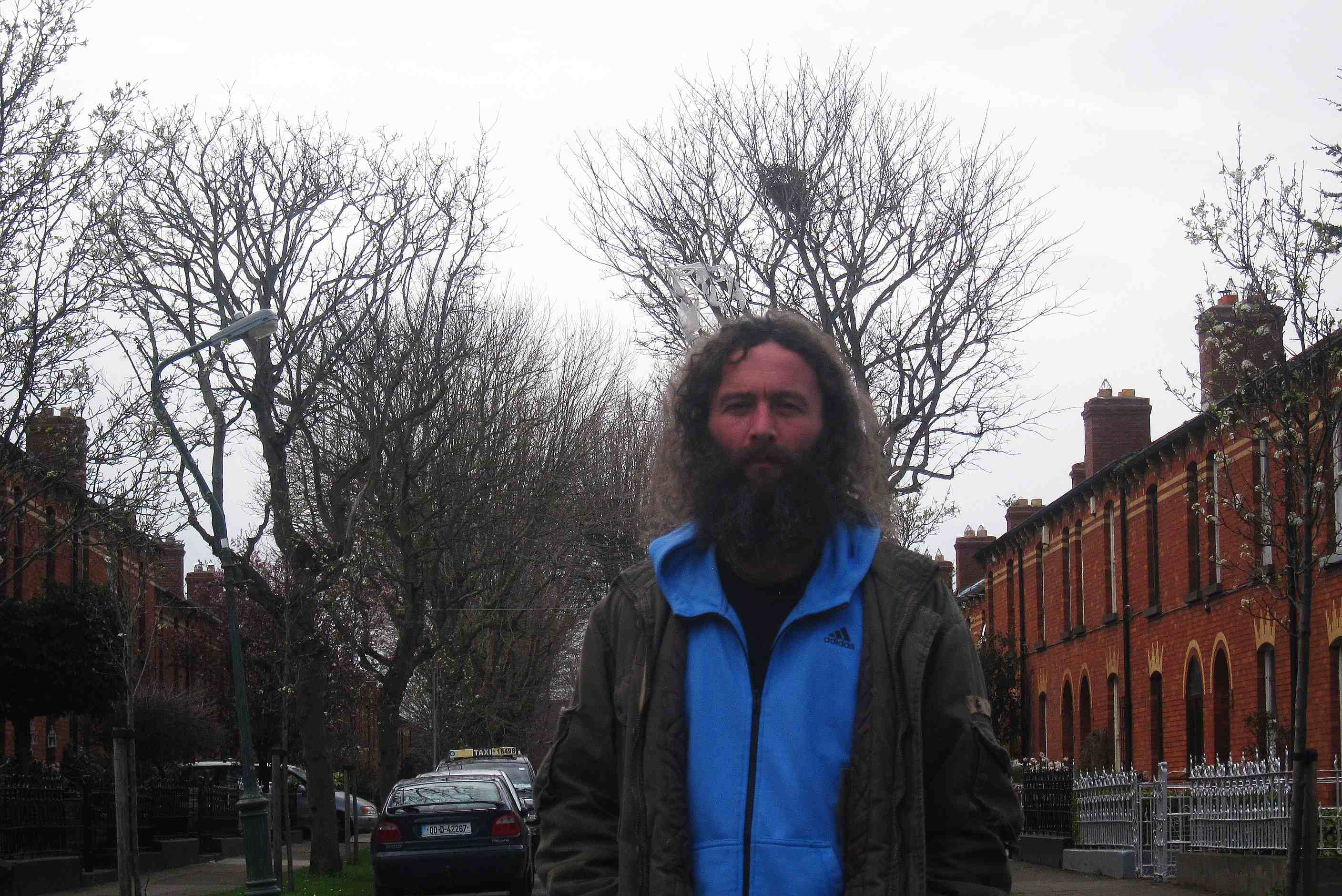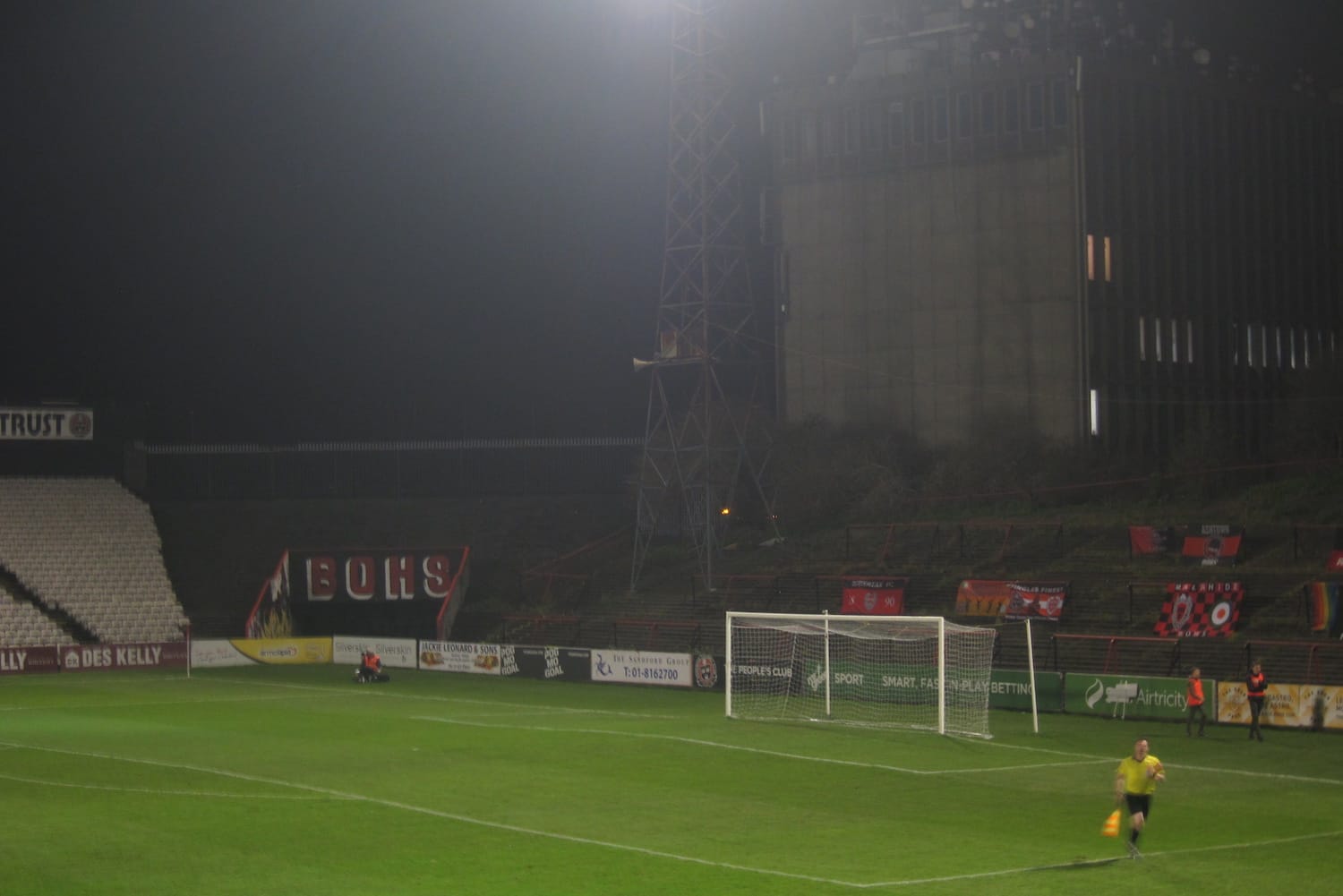What’s the best way to tell area residents about plans for a new asylum shelter nearby?
The government should tell communities directly about plans for new asylum shelters, some activists and politicians say.
Back when he played professional football, John Cummins kept his poetry to himself. These days, as poet in residence for Bohemians FC, he can flaunt it pitchside.

Under the lights of Dalymount Park, two football teams warm up.
“They’ve far more sharper movements,” says poet John Cummins.
The Shamrock Rovers players, in green-and-white jerseys, pass at short sharp angles on a square of the pitch below. Those in yellow bibs guard balls from opponents. The slick passes create a patchwork pattern.
Towards the North Circular Road end of the pitch, Bohemians, in red-and-black tops, run in 20-metre bursts.
Cummins rests his folded arms on the bar in front of him. He studies the warm-ups of these fierce rivals with as much interest as others would give a penalty shoot.
On the loudspeakers, Red Hot Chili Peppers’ “Can’t Stop” reverberates through the Jodi Stand. The air smells of salt-and-vinegar chips.
Opposite, facing towards Peter’s Court, is an empty stand.
“Why is there no people there?” asks a child behind us, wrapped in a black-and-red scarf.
“It’s getting knocked down,” says the man beside him. “The stand is in bits.”
Dalymount Park slowly fills. The final third of the Jodi Stand fills quickest. Stewards in fluorescent-orange tracksuits block fans from going into the final third – the spot where the loudest of the crowd sing and chant. Deflated, they turn back and search for empty seats elsewhere.
“It’s hard to get the warm-up right,” says Cummins. He checks the time on his old phone. There are fifteen minutes before kick-off.
You don’t want to tire out before the match has started, he says. But you don’t want your muscles to be cold and end up injured, either.
Cummins knows his way around a football field, although it’s not something you’d immediately guess from first appearance. More than six feet tall, with long black hair and a tangled beard, he looks like a poet of the noble bardic tradition, adrift in the stands of Dalyer.
Yet, Cummins has lived a life in football. A promising youth player, he had trials at seventeen with Arsenal, played for Munich 1860 in the early nineties and later played and coached Munich Irish Rovers. He kept his poetry secret.
Now as poet in residence at Bohemians Football Club, he can finally marry his two great passions.
Cummins is the second poet in residence for Bohemians Football Club.
Lewis Kenny, the spoken-word artist who previously had the post, finished up midway through the last season.
“What’s a poet’s job?” Cummins says, sat outside Woodstock cafe on Phibsborough Road, earlier on that mild February night, an hour and a half before kick-off.
To “give voice maybe to where people who don’t have a voice”, he answers. “I think I heard one definition of poetry that is, ‘The best words in the best order’,” he says, quoting Samuel Taylor Coleridge.
His job, he says, is to find those words.
Then he reflects again.”Like, who really cares about the poet?” he says. “People care about the form of the right back or the left back and who is really coming up through the youth team.”

It was Daniel Lambert, a former director of the club, who came up with the idea that the Phibsboro club should have a poet in residence.
Most football clubs were set up as social clubs rather than football clubs, says Lambert. Getting poets and artists involved in Bohemians was a way to recognise that tradition, and to give them a platform.
“A lot of the traditional Bohs fan base I suppose would be male and wouldn’t engage with poetry,” Lambert says, by phone. “And this kind of maybe opens them up to the arts in a way that’s relatable.”
Cummins can basically do what he wants in the role, says Lambert.
Sat in front of Woodstock, Cummins glances towards Dalymount Park. It’s due to be rebuilt as part of a redevelopment plan for Phibsboro town centre.
That’s on his mind. “I think if anything I’m going to try define the job myself to try and capture Dalymount before it’s gone. My own experiences of it, other people’s experiences of it,” says Cummins.
His first poem for the club delved into this very topic. It was an ode to the fans that take the trip to Dalymount on match days.
It was filmed by PushPull Collective, and has racked up nearly 50,000 views on Twitter since its release last month.
Back at Dalymount later, the derby kicks off. Cummins keeps a close eye on Luke Wade-Slater. He’s a new winger for Bohemians.
Number 27 drifts from the right wing into the centre, says Cummins. Is that inexperience? he wonders aloud.
The Bohemians captain castigates him. But Wade-Slater is drawn like a homing pigeon to the central third of the football pitch.
It makes his job easier, says Cummins, pointing to Derek Pender wearing the captain’s armband at right back.
If Wade-Slater is on the wing, all he has to do is look up and pass. If the winger drifts into the centre, he can’t see him. He needs to keep the winger by the sidelines and make it easier for him.
“John O’Shea made a career out of doing that,” says Cummins.
At half-time, Cummins is happier with Wade-Slater. He’s kept on the wing.
It’s a position Cummins is no stranger to. That’s where he would play.
His grandfather gave him a line of advice, so he’d know he was doing the job right, he says: “Make sure you finish the game with white paint on your boots.”
As a kid in Coolock, Cummins was obsessed with football, he says. He would organise mini training sessions and football drills on the street.
Some of the kids he’d encourage to go to Home Farm or St Brendan’s, where, he says, they’d get proper support and training.

Years later, Cummins had trials with Arsenal before moving to Munich in the early nineties, and playing professional football for Munich 1860, just before their promotion to the second division of the German league.
“I went up for a header and I clashed heads and went down and woke up in a hospital. I was knocked out on the way down. When I went down my foot went back and snapped all the ligaments,” says Cummins.
That was only the start of it, he says. There was issues over whether he was insured or not, as the game was played in Austria, and who was liable for the hospital fees.
Then there was the “fussball pass”, a pass that every player in Germany needs to have in order to play football. After the injury, Munich 1860 wouldn’t return the pass to Cummins and demanded any club interested in him to fork over an unreasonable sum.
“They kept it out of spite,” says Cummins, meaning that two seasons went by before Cummins was both fit and eligible to play football again. Unfortunately, some of his hunger for the game had died away.
“But all the time I was writing poems,” says Cummins.
From the age of 15, Cummins was writing poetry regularly. Patrick Kavanagh was a big influence. As was a teacher who awakened him to the vibrancy of language, animating every poem and text with life through her recitals.
He remembers one day being caught by a teacher one day, writing lyrics at the back of the class.
Rather than confiscating the notebook, or shaming him by making him read the words aloud, his teacher gave it back to him the following day, along with a book of poetry, and told him to keep at it.
Nowadays, Cummins works as a facilitator for workshop on rap and lyrics. “I do that in schools, community organisations, lads and lasses, early school-leavers, addiction, mental-health issues, homeless,” he says.
But his love of football still opens doors. It surprises him, he says. A day earlier, he had been working with a group of early school-leavers in Lucan, and they had a kickabout after class.
“One of them kicked the ball to me and I just did a half volley and I caught it sweet and it went into the top corner,” says Cummins. “Even just that one moment opened them up to me, they might listen to me more now, without the resistance.”
A few days later, sitting outside Bang Bang cafe, a cafe owned by Lambert, just off Connaught Street, Cummins takes a collection of papers out of his pocket. They’re A4 pages, folded into quarters, held together with a hair bobbin, with words written meticulously in black pen.
The poem at the top of the pile is Cummins latest, written during the celebrations of Bohemians’ one-nil win that stretched into the small hours on Dorset Street’s Bleecker Street Cafe.
He gives me a quick look at it before breaking into a recital.
“Top of the table clash at the home of football / Totes in fash poeming football / The grand green glow of floodlit football …”
Get our latest headlines in one of them, and recommendations for things to do in Dublin in the other.